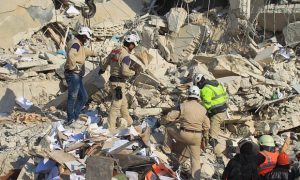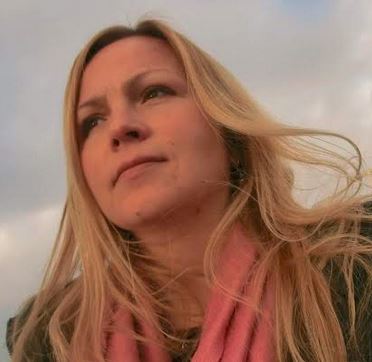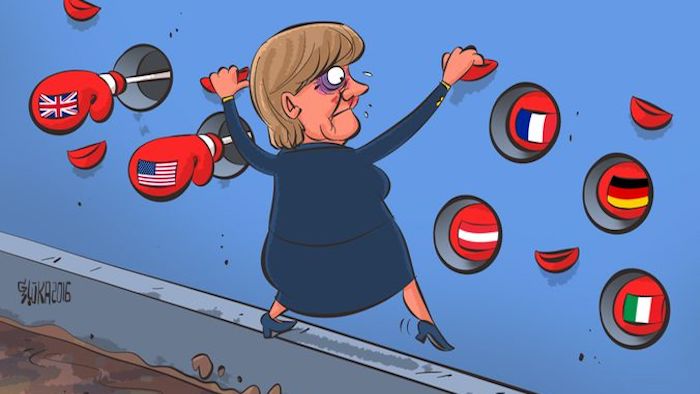As Britons are heading for a referendum on June 23rd to decide if they are to remain within the European Union (EU) or exit it (known as the “Brexit” vote), more voices are warning that Brexit will inevitably “start a process of fragmentation of the political and security structures on which the post-World War Two and post-Cold War European order was built.” The British WWII war veterans who remember the high price paid for freedom urge the UK to stay in the EU or “otherwise risk the stability in Europe that they fought to ensure.”
Since the end of WWII, Europe’s peace has never been as fragile. Russia’s hostility to the West and military expansionism on the European continent has reached unprecedented heights since the Cold War days. In March 2014, Russia illegally annexed and occupied the Ukrainian territory of Crimea. This unprecedented abuse of international laws and the violation of the 1994 Budapest Memorandum on sovereignty and territorial integrity of Ukraine was widely condemned and rejected worldwide, including the 2014 United Nations General Assembly Resolution 68/262 supported by 100 countries. The EU, the US, other individual countries and international organizations applied sanctions against Russia as a result of its actions.
After occupying Crimea, the Putin regime instigated the war in East Ukraine in an attempt to further destabilize the country and keep it in the Russian orbit of influence. Russia continues supporting, financing and supplying terrorists in East Ukraine who commit atrocities against civilians, including the shooting down of flight MH17 with close to 300 passengers, vandalizing and robbing businesses, and destroying infrastructure. During the now two year war, 10,000 people
have been killed, over 20,000 people are wounded, and close to 2 million people are internally displaced after losing their homes. The Russia-backed terrorist troops continue to violate the Minsk agreements keeping the death toll rising. Since the beginning of 2016, the truce agreements have been violated 7,000 times.
Russia continues airspace violations of the Nordic countries in Europe, and has increased its military activity and border violations of the Baltic States. In the face of the worsening security situation around these countries, the defence ministers of Sweden, Norway, Finland, Denmark and Iceland signed a joint declaration last year which states: “Russia’s conduct represents the biggest challenge to European security”. “We must be prepared to face possible crises or incidents,” the ministers said warning that Russia is prepared to use “military means in order to reach their political goals.” Sergey Lavrov, Russia’s Minister of Foreign Affairs, openly issued a threat of a military response if the two non-aligned EU members of Finland and Sweden joined NATO. NATO today is looking into the ways to bolster security of the Baltic states against possible Russian aggression. In its recent report entitled “2018 Security Outlook”, the Canadian Security Intelligence Service cautions the Kremlin was “mobilizing for war”.
Putin wants to divide and conquer, and as Kasparov predicts a “Brexit would be the perfect gift for Vladimir Putin”. He explains that, Putin’s goal is to “weaken the institutions, including NATO and the EU, that could thwart his neo-Soviet ambitions. [...] Putin sees Europe as his enemy and wants his adversaries to be divided, smaller and weaker”.
Putin interferences and aggression are not limited to the European continent. Russia continues its unwavering support of Bashar al-Assad including the supply of deadly weapons used against Syrians that challenge his dictatorial regime. Since 2011, the Assad army wiped out entire cities using barrel bombs, chemical weapons, concentration camps, and using deliberate starvation in many besieged cities, including Madaya, Moadamiyet , and Yarmouk camp with Palestinian refugees – all of this leading to death of 470,000 people. Russia’s military support of Assad, bombing of civilians camouflaged as an operation against ISIS and the blocking of the UN Security Council attempts to resolve the crisis and provide aid to Syria has led to the largest refugee crisis since WWII forcing close to 5 million refugees seek safety outside Syria (by UNHCR’s estimate).
Russia-backed Assad’s regime and the former Saddam regime contributed to the rise of the jihadist Islamic State in Iraq and the Levant, which has been involved in mass killings and the genocidal targeting of Yazidis and other religious minorities and the executions for homosexuality. ISIS has also claimed the responsibility for the brutal terrorist attacks around the world including carnage in Europe (Paris and Brussels) and the US. It continues its atrocities and recruits terrorists in the West to help achieve its ultimate goal of establishing a global caliphate. While security screening is an obvious must, suspending immigration will not stop homegrown terrorism neither in Europe nor in the US. The prospect of Europe’s disintegration and weakened anti-terrorism efforts of the EU is likely to benefit Islamist terrorist groups like ISIS.
The Kremlin propaganda machine is used as an informational war weapon to distort reality and Russia’s true intentions and actions both in Ukraine and Syria. The state-owned official media, other propaganda outlets and an army of trolls are engaged by the Kremlin and sympathizers to promote anti-West and anti-EU rhetoric and fear-mongering xenophobic reporting, which also feeds into the Brexit campaign.

Neo-imperial ambitions of Russia and ISIS terrorism are some of the main security issues facing European countries, most of which are members of the EU. These are also the issues that Brexit fails to address in its campaign. Furthermore, Brexit campaigners go as far feeding into anti-EU Kremlin propaganda, which demonizes the EU. Boris Johnson, one of the leading Brexit campaigners, was blasted as Putin apologist for blaming EU foreign policymaking for what happened in Ukraine. The former London mayor ignores the fact that Putin’s supporters from far-right parties and groups of the European nations undermine the EU’s strong stance and demand removal of sanctions in response to Russia’s aggression against Ukraine. These were the Europe’s neo-Nazi such Enrique Ravello, a Catalonian far-right MEP; Mateusz Piskorski, a Polish former MP and Bela Kovacs, a far-right Hungarian MEP who traveled to observe illegal fake referendum in Crimea conducted under the guns of the Russian military. Mr. Johnson also conveniently ignores that the far-right nationalist parties from Europe, including the British National Party and the Britain First were at the pro-Kremlin International Conservative Forum in St. Petersburg to proclaim their enthusiastic support for Russia’s annexation of Crimea and back a resolution to remove EU sanctions against Russia. Not only do these xenophobic groups endorse Russia’s military assault against Ukraine, they are eager campaigners and supporters of Brexit.
While the British public is enraged and polarized with the Brexit misinformation, lies, myths and hate messages, they will need to carefully balance their concerns about the shape of bananas and cleavage regulations with the not so subtle internal and external threats to a peaceful, united and prosperous Europe as envisioned by the foundering fathers of the EU. If the over 100 dead during Euromaidan, the Ukrainian Revolution of Dignity and many thousands who died in East Ukraine for the dream of joining the EU one day is not convincing enough, maybe the brutal murder of Britain’s own MP Jo Cox will be a wake-up call for those who want to be on the wrong side of history.
May the words of the British WWII veteran Patrick Churchill guide us: “The only solution is to bind together, hold together, there we find the strength.”
 Inna Platonova is the Founder & Coordinator of Russian Speaking Canada for Peace group, which brings together people of Ukrainian, Russian, Belarusian, and other origins in Canada and overseas who advocate for peace, condemn Russia’s aggression against Ukraine and support the principles of sovereignty, tolerance and democracy. Inna holds a PhD from the University of Calgary and is involved in research and consulting in the area of international development.
Inna Platonova is the Founder & Coordinator of Russian Speaking Canada for Peace group, which brings together people of Ukrainian, Russian, Belarusian, and other origins in Canada and overseas who advocate for peace, condemn Russia’s aggression against Ukraine and support the principles of sovereignty, tolerance and democracy. Inna holds a PhD from the University of Calgary and is involved in research and consulting in the area of international development.Related:
- The rapidly changing landscape in Europe
- Ukraine -- the bastion of a new, better order in Europe
- Why do Ukrainians want to be in Europe?
- Moscow tries to divide and weaken Europe but its actions unite and expand it, Gudkov says
- Moscow enjoying great success with far left parties in Europe, new study finds
- Putin allying with Europe's far right to change Europe, Eidman says
- Kyiv must counter Moscow disinformation about sanctions impact on Europeans, Inozemtsev says
- Garry Kasparov: A referendum on the values of Europe
- Timothy Snyder: Yes to security in Europe
- Ukrainians overwhelmingly support European integration | Infographics





